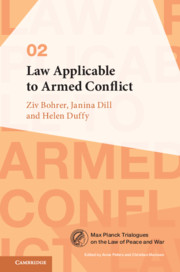Book contents
- Law Applicable to Armed Conflict
- Max Planck Trialogues on the Law of Peace and War
- Law Applicable to Armed Conflict
- Copyright page
- Contents
- Introduction: International Law Governing Armed Conflict
- 1 Trials and Tribulations: Co-Applicability of IHL and Human Rights in an Age of Adjudication
- 2 Divisions over Distinctions in Wartime International Law
- 3 Towards a Moral Division of Labour between IHL and IHRL during the Conduct of Hostilities
- Conclusions: Productive Divisions
- Index
- Books in the Series
Introduction: International Law Governing Armed Conflict
Published online by Cambridge University Press: 09 January 2020
- Law Applicable to Armed Conflict
- Max Planck Trialogues on the Law of Peace and War
- Law Applicable to Armed Conflict
- Copyright page
- Contents
- Introduction: International Law Governing Armed Conflict
- 1 Trials and Tribulations: Co-Applicability of IHL and Human Rights in an Age of Adjudication
- 2 Divisions over Distinctions in Wartime International Law
- 3 Towards a Moral Division of Labour between IHL and IHRL during the Conduct of Hostilities
- Conclusions: Productive Divisions
- Index
- Books in the Series
Summary
Wars are emergency situations, but in contrast to the saying according to which necessity knows no law, they are not lawless situations at all. Quite to the contrary, an extensive body of international treaties and customary international law provides detailed regulations. However, which rules do and should apply to what kinds of situation is a hotly debated issue and the subject of this book. Different regulatory paradigms are competing for how wartime situations shall be regulated – with significant legal, practical and institutional implications. This book approaches the legal issue in a Trialogue. The characteristic feature of a Trialogue is to approach questions of international law from three perspectives, which differ in terms of their regional background, technical method, professional specialisation and worldview of the co-authors. The three authors (who are embedded in their particular social and cultural context) approach the law from their particular perspective, which invariably influences what they identify as the relevant rules and how they interpret and apply those. The core method of the ‘Max Planck Trialogues on the Law of Peace and War’ is to positively acknowledge the diversity of perspectives, and to make constructive use of them (multi-perspectivism).
- Type
- Chapter
- Information
- Law Applicable to Armed Conflict , pp. 1 - 14Publisher: Cambridge University PressPrint publication year: 2020



